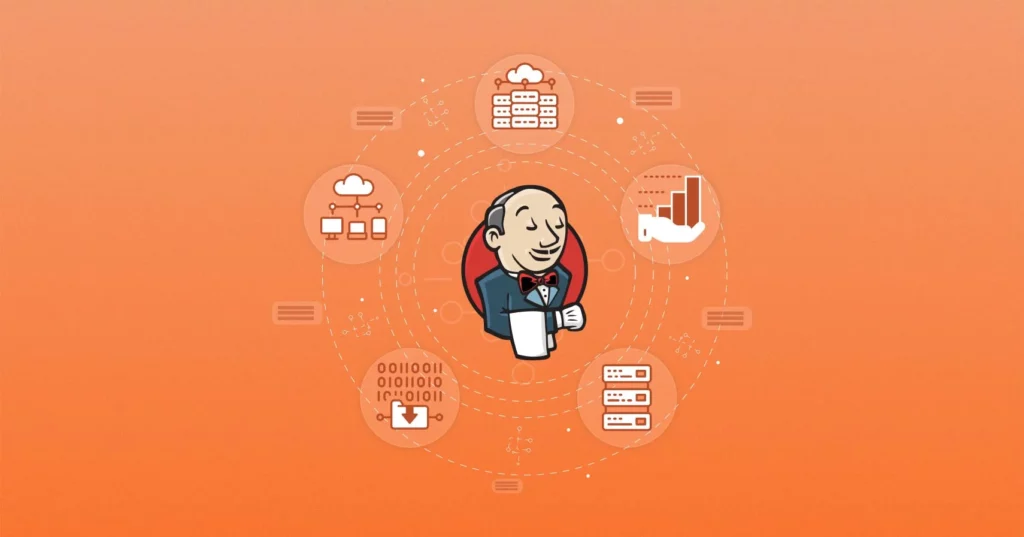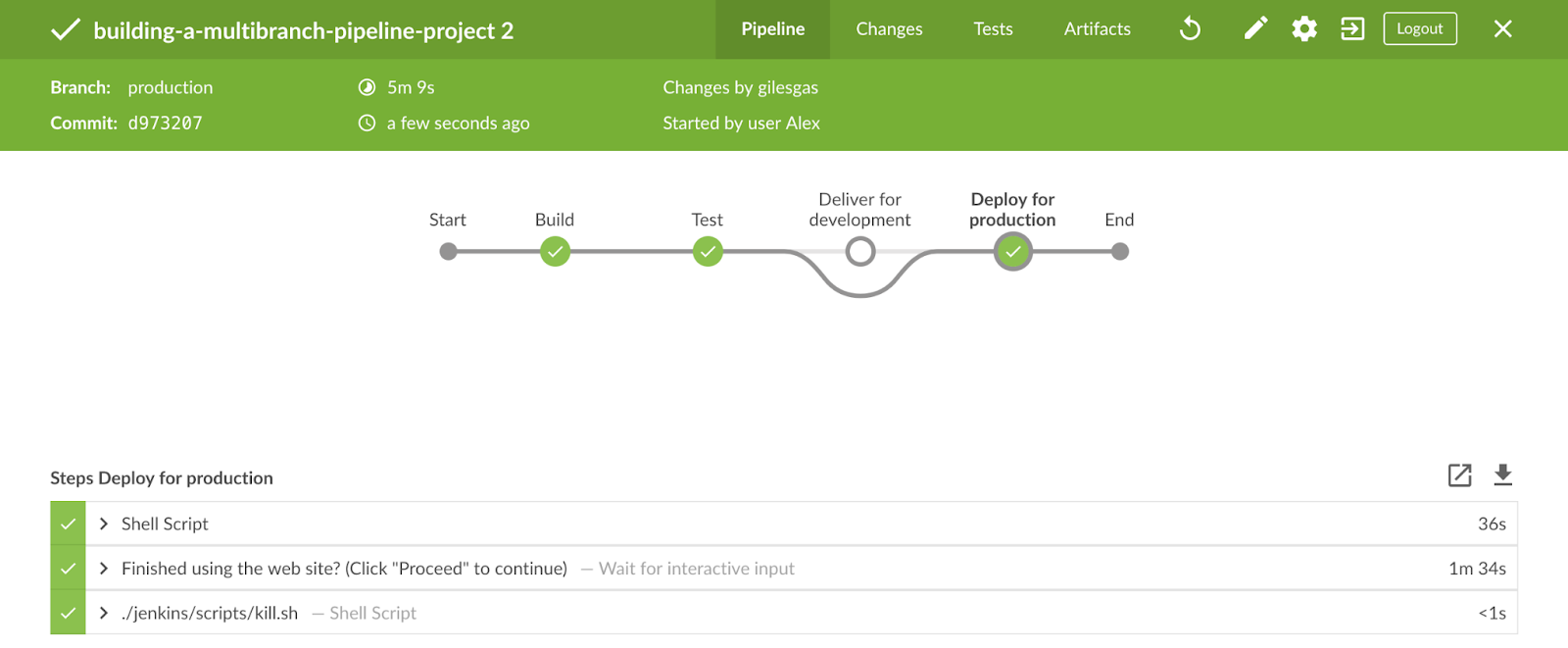Common Jenkins Interview Questions & Answers [UPDATED 2024]

Table of content
Within this article, we are going to embark on the key features of utilizing Jenkins in the Software SDLC (Software Development Life Cycle) process, with a particular emphasis on Jenkins interview questions. This article will begin with an introduction to Continuous Integration and Continuous Deployment, as well as the role Jenkins plays as an automation tool in the SDLC process, followed by some in-depth discussions on Jenkins’ capabilities and how- to’s, with a focus on Jenkins interview questions at the Basic, Intermediate, and Advanced levels.
With the most recent developments in the field of Continuous Integration and Continuous Deployment for the Software Development Life-Cycle (SDLC) process, it is now feasible to deliver produced software to end-users considerably faster than it was previously. Even though there are several tools available to help development teams produce software in a timely and continuous manner, the collection of open source tools accessible to do so will have an advantage.
Jenkins, an open-source program meeting the demands of software teams from – Developing, Building, Testing, Deploying, and Monitoring – the software, is one such great, open-source solution enabling continuous & fast-paced software development in the current Dev-Ops age.
Jenkins may refer to a wide range of software-based automation tasks that can be done on-premises or in the cloud. Jenkins offers a lot of advantages over other current automation tools, the most important of which is that it is entirely open-source and extremely extendable thanks to its plugin-based design. Now, the 20 Jenkins interview questions stated below are the most common Jenkins interview questions.
Jenkins Interview Questions and answers:
What is Jenkins?
Answer: Jenkins is a self-contained, open-source automation server used to automate a wide range of operations related to software development, testing, and delivery or deployment. Jenkins may set up using the native system packages, Docker, or run independently on any computer that has a Java Runtime Environment (JRE) installed.
Explain to me Continuous Integration, Delivery, and Deployment?
Answer:
- Continuous Integration: A software development approach in which modifications to the software at once merged into the main code as soon as a patch is ready, guaranteeing that the program is always ready to generate, test, deploy, and monitor continuously.
- Continuous Delivery: This is a Software Development Procedure in which continuously integrated (CI) updates tested and released in a specific environment continuously, often via a manual release process, once all quality checks are passable.
- Continuous Deployment: A Software Development method in which continuously integrated (CI).
What is a Jenkins job?
Answer: A Job/Project is the core unit of logical activity (such as a software build, and automation job, test execution, and so on) that carries out using the Jenkins automation server and other needed plugins, settings, and infrastructures. Jobs can be of several types, such as freestyle projects, multi-configuration, pipeline, multi-branch, and so on.
What is a Jenkins Pipeline?
Answer: The pipeline is a sort of Jenkins job that orchestrates long-running operations that can span several build agents. It is essentially a sequence of stages governed by stated logic. It is appropriate for creating pipelines (formerly known as processes) and/or arranging complicated operations that are difficult to accomplish with a freestyle job.

What are the types of Jenkins pipelines?
Answer: Jenkins Pipelines can be either Declarative or Scripted in form. Declarative pipelines use a lot of, generic, predefined build steps/stages (i.e. code snippets) to build our job based on our build/automation requirements, whereas Scripted pipelines let the steps/stages be custom-defined and used using groovy syntax, which provides better control and fine-tuned execution levels.
Explain how you store credentials in Jenkins securely?
Answer: Credentials can be securely stored in Jenkins using the plugin, which stores various types of credentials such as – username with a password, SSH username with the private key, Jenkins Build Token, Secret File/Text, X509 & other certificates, Vault related credentials securely with proper encryption & decryption as need to.
How can we temporarily halt the execution of a scheduled job?
Answer: Disable the job from the details page to temporarily prevent all planned executions and other factors/events from triggering the job, then re-enable it to continue the schedules/triggers. If a job is no longer necessary, we can remove it from the jobs list view page.
Tell me in detail what is Multibranch Pipeline?
Answer: It is a pipeline task that can be customized to generate a collection of Pipeline projects based on the detected branches in a single SCM repository. Another usage is to configure pipelines for all branches of a single repository, for example, if we keep multiple branches (i.e. production code branches) for different configurations such as locales, currencies, nations, and so on.

Define Jenkins Build Bring about?
Answer: Build Bring about is a text property that specifies what caused a job’s build to be triggering, such as a Jenkins User (via the UI), a Timer for Scheduled jobs. This can indicate the type of build – whether nightly, manual, automated, and so on.
Explain how Jenkins knows when to execute a Scheduled job/pipeline and how it works?
Answer: Jenkins master will have cron entries configured for the jobs based on the configurations of the scheduled jobs. When the time arrives for a certain task, it instructs agents (depending on the work’s configuration) to execute the job with the necessary settings.
What are the credentials types that Jenkins supports?
Answer: Credentials in Jenkins are a set of information used to authenticate with internal/external services to complete an activity. Credentials Binding plugin provides and manages Jenkins credentials, which is a built-in plugin. Jenkins can deal with the following credentials:
- Secret text: A token, such as an API token, JSON token, or similar.
- Secret file: Refers to the secret file that we use to validate some secure data services and security handshakes.
- SSH Username with a private key: A public/private SSH key pair for Machine-to-Machine authentication.
- Certificate: a PKCS#12 certificate file and a password, if desired
- Credentials for Docker Host Certificate Authentication.
And, as one might expect, this can be expendable to a variety of other extensible credential types, such as AWS credentials, Azure secrets, and so on, by utilizing widely accessible plugins.
What are the Scopes of Jenkins Credentials?
Answer: (very important Jenkins interview question) Jenkins credentials might be of one of two types: global or system-wide.
Global: the credential is valid for all tasks specified in the Jenkins instance (i.e. for all jobs). This is better suited for user Tasks (e.g., freestyle, pipeline, or other jobs) to authenticate with target services/infrastructures to achieve the job’s objective).
System: This is a unique scope that allows Jenkins (the core Jenkins capabilities and some installed plugins) to authenticate itself to external services/infrastructures to accomplish some stated tasks. Sending emails, for example.
What does Jenkins Shared Library stand for and how is it useful?
Answer: As an organization begins to use more pipeline jobs, there is a risk that more and more code will be duplicated in each pipeline job because a portion of the build/automation procedures will be the same for the majority of the tasks. In such a case, every other new forthcoming task should use an identical piece of code. The Jenkins project introduced the idea of Shared Libraries to code to minimize duplications – DRY – Don’t Repeat Yourself.
Common libraries are code collections that may be useful independently for more than one pipeline task. These libraries help the pipeline code’s maintenance, modularity, and readability. It also expedites the automation of new jobs.
What would happen if a Jenkins agent is offline and what is the best practice in such a situation?
Answer: When a task is connecting to a certain agent on a given node, that agent is the only one that can perform the work request; no other agents can. If the target node is down or all of the agents on it are busy constructing other tasks, the triggered job must wait until the node comes back up or an agent from it becomes available to perform the triggered build request.
As a result, a triggered job may occasionally wait indefinitely without being aware that the destination node is unavailable. As a result, it is usually best practice to assign jobs to a collection of nodes and agents, which refers to as a ‘Label.’ When a job is connecting to a Label, instead of a single node/agent, any of the nodes/agents in the label can fulfill a build request when activating the job. This allows us to shorten the total turnaround time of the projects. Even yet, if a job requires more time from the nodes/agents, it is time to consider adding more nodes/agents.
How to get the Jenkins version programmatically in Jobs/Pipelines or nodes other than the master?
Answer: Load the top-level page or any top-level Remote Access API path, such as the ‘…/API/*’ page, and look for the ‘X-Jenkins’ response header to determine the version of Jenkins. This contains Jenkins’ version number, such as “1.404”. This is also an excellent technique to determine whether or not a URL is a Jenkins URL.
Define post in Jenkins?
Answer: post is a section of the pipeline that contains several additional actions performed after the pipeline is complete. The execution of all stages within the condition block is dependent on the pipeline’s completion state. The circumstances of the condition block are as follows: altered success, always, failure, unstable, and aborted.
Explain how to create a backup and copy files in Jenkins
Answer: Jenkins stores all settings, build logs, and configurations under the JENKINS HOME directory. Back up the JENKINS HOME directory regularly if you wish to generate a backup of your Jenkins. It contains all of the job configurations as well as the slave node configurations. As a result, duplicating this directory regularly allows us to keep a backup of Jenkins. You can keep a separate backup file and copy it whenever you need it. If you wish to duplicate the Jenkins task, simply duplicate the job directory.
What is Flow Control in Jenkins?
Answer: Flow control in Jenkins follows the pipeline structure (scripted pipeline) that runs from top to bottom of the Jenkins file.
Explain why Jenkins is a Continuous Delivery Tool?
Answer: We saw the Continuous Delivery workflow in the previous question; now let’s take a look at the step-by-step procedure of why Jenkins refers to as a Continuous Delivery Tool:
- Developers make modifications to the source code in their local environment and submit it to the code repository.
- When a change is in place, Jenkins runs a series of tests and code standards to determine whether the changes are ready for deployment.
- The developers after a successful construction examine it.
- When all of the modifications have been okay by the developers, testers, and customers, the final result is manually stored on the production server for usage by the product’s end users.
Explain what the blue ocean is?
Answer: (this is a very important Jenkins interview question) Blue Ocean is a reimagining of Jenkins’ user experience. Blue Ocean for Jenkins Pipeline created from scratch, but also compatible with freestyle jobs. It minimizes clutter and enhances clarity. The primary characteristics of Blue Ocean are as follows:
- Sophisticated visualizations of continuous delivery (CD) Pipelines, providing for a quick and intuitive understanding of the state of your Pipeline.
- Pipeline editor – makes Pipeline creation approachable by leading the user through an intuitive and visible process of creating a Pipeline.
- Personalization to meet the requirements of each team member based on their position.
- When action is If action is necessary and/or issues arise, precise pinpoints are essential. Blue Ocean highlights where attention is necessary for the pipeline, which will facilitate exception management and increase productivity. and/or problems develop, pinpoint precision is If action is necessary and/or issues arise, precise pinpoints are essential. Blue Ocean highlights where attention is necessary for the pipeline, which will facilitate exception management and increase productivity. Blue Ocean identifies where in the pipeline attention is If action is necessary and/or issues arise, precise pinpoints are essential. Blue Ocean highlights where attention is necessary for the pipeline, which will facilitate exception management and increase productivity., making exception handling easier and boosting productivity.
- When collaborating on code with others on GitHub, Bitbucket, etc., native integration for branch and pull requests ensures optimum developer productivity.
Professional hiring managers in the field carefully chosen these Jenkins interview questions. Every Jenkins interview question addressed professionally and properly. But, it would be harmless if you conducted a further study for better preparation. Concerning preparation, Huru is the best AI-based app to help you perfectly prepare for a job interview
Huru is an AI-powered career coaching service that aims to precisely prepare job seekers to ace every job interview through simulated interviews and in-depth analysis. Besides, Huru’s breakthrough technology provides job seekers with personalized, timed, and scored interviews that provide real-time insights for more effective preparation. Huru is your personal coach.

Elias Oconnor
Senior Copywriter